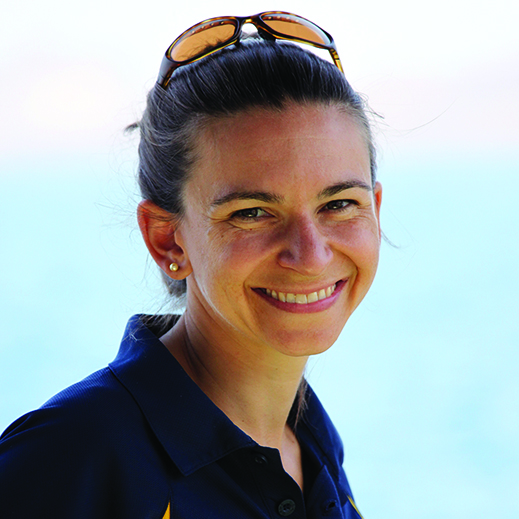Katy Croff Bell has helped discover dozens of ancient shipwrecks and new species of marine organisms. Now she brings the abyss to your desk, streaming her adventures aboard the Exploration Vessel Nautilus via Nautiluslive.org. “The most exciting part of what I do is share discoveries in real time with millions of people all over the globe,” Bell says.

At MIT, Bell worked with Professor David Mindell, PhD ’96, and his then-new Deepwater Archaeology group. They undertook expeditions to the Black Sea, working off small Turkish fishing boats, checking out features on the seafloor with a side-scan sonar and a remotely operated underwater vehicle. “It was great experience to apply what I was learning in classes at MIT to a project in the field,” Bell says. It was also a chance to work with underwater archaeologist Robert Ballard, who found the Titanic.
Bell was a leader of several marine and engineering student societies at MIT, and she helped create an umbrella organization called 13SEAs, the Course 13 Student Engineering Association, which lives on as MIT’s ocean engineering, naval architecture, and marine technology student organization.
After graduation, Bell served as a marine policy fellow in NOAA’s Office of Ocean Exploration in Washington, D.C. In 2006, the National Geographic Society awarded Bell an Emerging Explorer Award. She earned a master’s degree in maritime archaeology at England’s University of Southampton, and then she joined Ballard’s research group at the University of Rhode Island, where she earned a PhD in geological oceanography in 2011. She’s now the vice president and chief scientist of the Ocean Exploration Trust, leading expeditions on Nautilus in the Black Sea, the Mediterranean, the Caribbean, and the Gulf of Mexico. “We’re going to places that have never been explored to see what’s there,” she says. “There are things we can’t even conceive of out there, and it will take a long, long time to fully understand our own planet.”
In 2014, Joi Ito named Bell an MIT Media Lab Director’s Fellow, a two-year appointment. “It’s been fun to come back and reconnect with incredible people doing groundbreaking research at the Institute,” she says. “I’ve been talking with Professor Ed Boyden, who uses fluorescent proteins to map neuron connections in the brain. There are marine organisms that glow; we can study their genomes and, we hope, identify new proteins and combine what we’re doing, pushing the boundaries of both our fields.”
Bell and her husband, fisheries biologist Rich Bell, live in Narragansett, Rhode Island, and are expecting their first child in April. During her maternity leave, Bell plans to use telepresence technology to participate in the 2015 Nautilus expedition through the Panama Canal to the Galápagos Islands from April through December.
Keep Reading
Most Popular
Large language models can do jaw-dropping things. But nobody knows exactly why.
And that's a problem. Figuring it out is one of the biggest scientific puzzles of our time and a crucial step towards controlling more powerful future models.
How scientists traced a mysterious covid case back to six toilets
When wastewater surveillance turns into a hunt for a single infected individual, the ethics get tricky.
The problem with plug-in hybrids? Their drivers.
Plug-in hybrids are often sold as a transition to EVs, but new data from Europe shows we’re still underestimating the emissions they produce.
Stay connected
Get the latest updates from
MIT Technology Review
Discover special offers, top stories, upcoming events, and more.